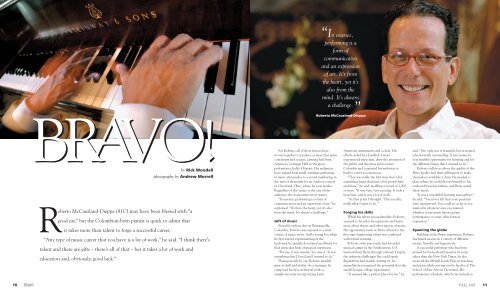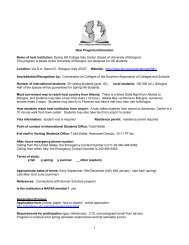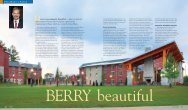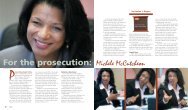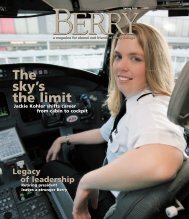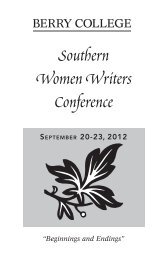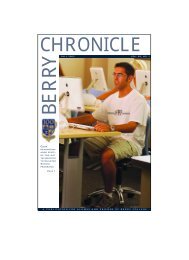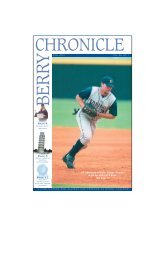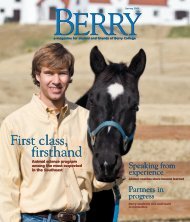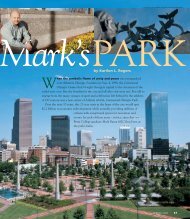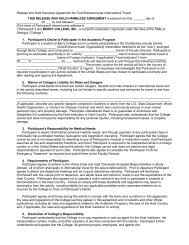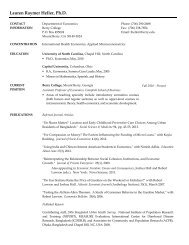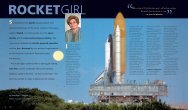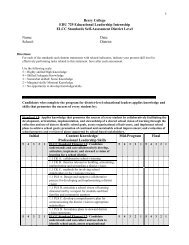Roberto McCausland-Dieppa (81C) - Berry College
Roberto McCausland-Dieppa (81C) - Berry College
Roberto McCausland-Dieppa (81C) - Berry College
- No tags were found...
You also want an ePaper? Increase the reach of your titles
YUMPU automatically turns print PDFs into web optimized ePapers that Google loves.
BRAVO!by Rick Woodallphotography by Andrew Morrell<strong>Roberto</strong> <strong>McCausland</strong>-<strong>Dieppa</strong> (<strong>81C</strong>) may have been blessed with “agood ear,” but the Colombian-born pianist is quick to admit thatit takes more than talent to forge a successful career.“Any type of music career that you have is a lot of work,” he said. “I think there’stalent and there are gifts – there’s all of that – but it takes a lot of work andeducation and, obviously, good luck.”“For <strong>Roberto</strong>, all of these factors havewoven together to produce a career that spanscontinents and oceans, carrying him fromAmerica’s Carnegie Hall to the greatperformance halls of Europe. His audienceshave ranged from small, intimate gatheringsof music aficionados to a crowd numbering inthe tens of thousands for an outdoor concertin Cleveland, Ohio, where he now resides.Regardless of the venue or the size of theaudience, the excitement never wanes.“In essence, performing is a form ofcommunication and an expression of art,” heexplained. “It’s from the heart, yet it’s alsofrom the mind. It’s always a challenge.”Gift of musicFrom his earliest days in Barranquilla,Colombia, <strong>Roberto</strong> was exposed to a widevariety of music styles. Still a young boy whenhe first started experimenting at thekeyboard, he quickly developed an affinity forthat particular form of musical expression.“For me, it was natural,” he stated. “It wassomething that I loved and I wanted to do.”Playing mostly by ear, <strong>Roberto</strong> steadilygrew in skill and ability. As a teenager, hecomposed his first orchestral work, asymphonic suite incorporating LatinIn essence,performing is aform ofcommunicationand an expressionof art. It’s fromthe heart, yet it’salso from themind. It’s alwaysa challenge.”<strong>Roberto</strong> <strong>McCausland</strong>-<strong>Dieppa</strong>American instruments and a choir. Hisefforts, aided by a handful of moreexperienced musicians, drew the attention ofthe public and the press in his nativeColombia and cemented his ambition tobuild a career as a musician.“That was really the first time that I didsomething larger than just a few people hereand there,” he said, recalling a crowd of 1,000or more. “It was very, very exciting. It took along time, and it was a lot of work.“At that point I thought, ‘This is really,really what I want to do.’”Forging his skillsWhile his talent was undeniable, <strong>Roberto</strong>yearned to broaden his repertoire and learnmore about theory and other aspects of music.His opportunity came at <strong>Berry</strong>, where for thefirst time burgeoning talent was combinedwith formal training.<strong>Roberto</strong>, who previously had attendedmusical camps in the Southeastern U.S.,learned about <strong>Berry</strong> through a friend. Despitethe inherent challenges (he could speakEnglish but had trouble writing it), heimmediately recognized the potential that thesmall Georgia college represented.“It seemed like a perfect place for me,” hesaid. “Not only was it beautiful, but it seemededucationally outstanding. It just seemed avery healthy opportunity for learning and forthe different things that I wanted to do.”<strong>Roberto</strong> still raves about the quality of the<strong>Berry</strong> faculty and their willingness to makethemselves available to him. He needed aplace where he could devote himself to hiscraft and focus his talents, and <strong>Berry</strong> suitedthose needs.“It was a wonderful learning atmosphere,”he said. “You never felt that your questionswere unanswered. You could go as far as youwanted in whatever area you wanted,whether it was music theory, pianoperformance or some other form ofexpression.”Spanning the globeBuilding on his <strong>Berry</strong> experience, <strong>Roberto</strong>has found success in a variety of differentarenas, literally and figuratively.A successful performer who has beenpraised for his keyboard mastery by noneother than the New York Times, he alsoreceived the Merrill Lynch Prize in teachingand piano while serving on the faculty of TheSchool of Fine Arts in Cleveland. Hisperformance schedule, which can include as10 BERRYFALL 2007 11
musical tastes have an international flair.Ironically, this Colombian-born musicianwho is now a naturalized American countsamong his favorite composers Ferenc Lisztand Bela Bartok of Hungary. His reputationfor performing their works is such that he hasbeen recognized with the Award Pro-ArtePatria by the Hungarian Ministry of Culture.He also was invited to take part in a recentcelebration at the United Nations markingthe 50th anniversary of the HungarianRevolution. Among those in attendance wasformer U.S. Secretary of State HenryKissinger.“Europeans, especially Central Europeans,are very, very serious about music,” <strong>Roberto</strong>noted. “To be able to go there and performessentially the music that was composed thereand for them to honor you – it’s a wonderfulfeeling.”12 BERRY“ Europeans, especially Central Europeans,are very, very serious about music. To be ableto go there and perform essentially the musicthat was composed there and for them tohonor you – it’s a wonderful feeling.”many as 25 solo concerts a year, has carriedhim to Latin America, Japan, India, theUnited Kingdom and Australia, in additionto numerous cities across Europe and theUnited States.Though all venues leave an impression,<strong>Roberto</strong> especially enjoys playing in theconcert halls of Europe. When he takes thestage in these venues – many of which dateback to the time of Beethoven and Brahms –he is keenly aware that history surrounds him.“Performing in these places andexperiencing the halls as they may haveexisted in centuries past certainly brings awhole different perspective to what you do,”he explained. “All of these performances andprograms have been thrilling.”Much like his travel schedule, <strong>Roberto</strong>’sKeeping it freshAs his career has progressed, <strong>Roberto</strong> hasembraced a multitude of outlets for hiscreative talents. In addition to performing onstage, <strong>Roberto</strong> also enjoys composing andarranging music. He has recorded a number ofCDs showcasing his work and recentlyreleased an educational compilation forchildren, Beethoven for Kids.When asked what he likes best, <strong>Roberto</strong>answered, “I think I enjoy all of it. I don’tknow what it would be to do one instead ofthe other, but I haven’t tried it yet. It’s alldifferent. Each requires different types ofpreparation, but they complement eachother.”Regardless of how he chooses to expresshis talents, <strong>Roberto</strong> is inspired by the act ofcommunication that music represents. In themarriage of his hands and the keyboard, hesees manifested the theory that all humancommunication evolved from sign language.“It’s performance art, so it’s never twicethe same,” he noted. “You have to keep thatin mind, and that makes it difficult. It’s achallenge; it’s never quite exactly as you wantit to be. And you’re always getting better,hopefully. It’s from the heart, and it’s cerebralas well. It involves all these aspects, and theykeep you going.” BPAUL O’MARA


